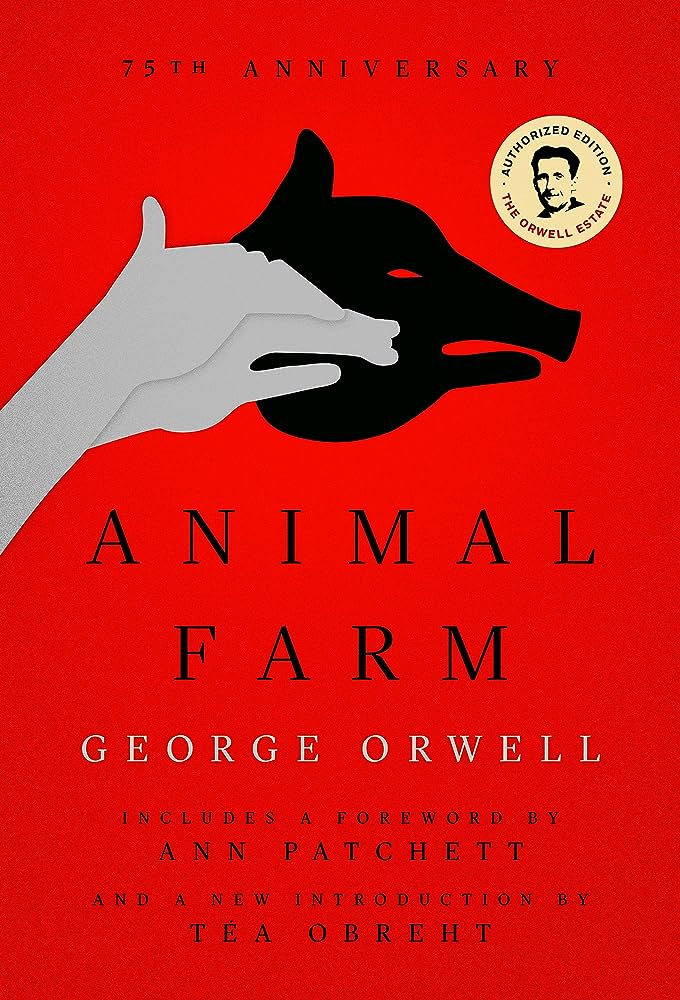
As a harsh critique of the communist-socialist institution, yet a stunning tale nonetheless, “Animal Farm” by George Orwell is a story of a rebellion between farm animals and their pitiless master: a man. Along this journey of revolution, however, the animals come to discover that their aspirations of freedom and dominance over mankind might not unfold as they hoped, and their reality shifts into something not quite right. The plot twist of this allegory is more so a gradual unraveling of events (which culminated to produce for the animals a nightmare just as horrible as before) rather than a singular point in the story, but this dramatic turn, and its unmatched ending, shall remain concealed for sake of spoilers.
Let one introduce the first element that makes “Animal Farm” stand–shines–above the rest: its twist. I am (personally) a sucker for a good plot-twist that makes the plot decently more complicated than before. Typically, anything that casts shade over an overly-enthusiastic environment with the darkness of reality, I find, can truly make a character and plot tens of times more interesting. It provides room for complexity and character growth in the cast. However, “Animal Farm'' takes this plot twist a step further; instead of aiding in the growth of the animals’ character plots, it ends up revealing their true personalities, or intentions, if you will. Though, with that, the actual character growth in the story is less than average.
Of course, one cannot forget another main element that supports why this novel is nationally acclaimed: its parallel between this tale of revolution and the socialist society. The reader should keep in note that, at the time of the book being written, tensions between the Soviet Union (a communist rule) and the U.S. (the Soviet Union’s political adversary) over economist ideologies had begun stirring, and George Orwell was one of the first to warn the world of socialism. “Animal Farm,” possessing elements of propaganda, false equality, and the egregious power distribution between civilians and their wealthier-counterparts (as well as terminologies), perfectly reflects his interpretation of, what seems to be, this nightmare. In my time reading this novel, his allusions to socialism were so copious and complex that it was hard to realize them all, yet it produced an important message to the world. I do not completely believe that I am literarily able enough to fully appreciate the vast realm of Orwell’s writing, but I can definitely understand that it definitely impacted the world in a way almost no other book had before.
While I could only briefly touch on the symbolism of the story, writing a “casual book review” like its a literary analysis in more than one paragraph would be nothing less than absurd. I think this time would be better spent if focused on why I actually loved this book so much, and what drove me to read the entirety of “Animal Farm” in less than a day. Now, I can say for sure that I am not a most avid reader of books, and the only times I would normally persist in getting to the end of a book would emerge at the final two weeks before a deadline. Even so, when I read this book, there was one thing that kept me invested. I cannot explicitly write this part of the story in a review, as that would hamper my obligations as a reviewer against spoilers, but I can do my best to describe the emotions that coursed through me at the time of reading. A long and tantalizing search of something as ambiguous as redemption had consumed me, like a tenacious tumor I just could not seem to satisfy. My need for closure had clouded my sense of time, and the hours soared past faster than I could realize, and I know for sure that this book could light something within other readers, too.
`“Animal Farm” exhibits a tale beyond the realm of normal humans, yet it brims with human complexity and emotions just the same: courage, grief, and manipulation. Orwell toys with his readers’ emotions of happiness, anxiety, and distress. It is a relatively shorter book than most other classics out there, but there nevertheless remains both some exciting and heart-wrenching moments in the story not found in other novels. For those plainly looking for a simple and direct story, the style of the book is written in pretty simple sentences (from what I could tell). Those that find complex layering in a story to be more appealing will still find this classic to be a great choice once they look even deeper into the story (in between the lines, if you will), as it contains character growth, stunning plot twists, and even allusions to the real world - it has everything every complex book should look for in a story. Personally, I am more keen to stories with layers to them, and, with the way “Animal Farm” is written, I would not be far off to say that this book is one of the greatest, if not the greatest, I had ever read to date.
Check out Animal Farm from NBPL.